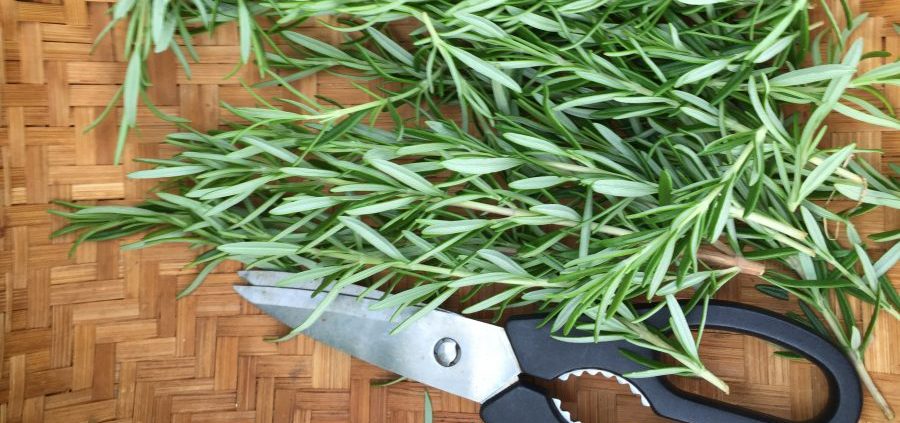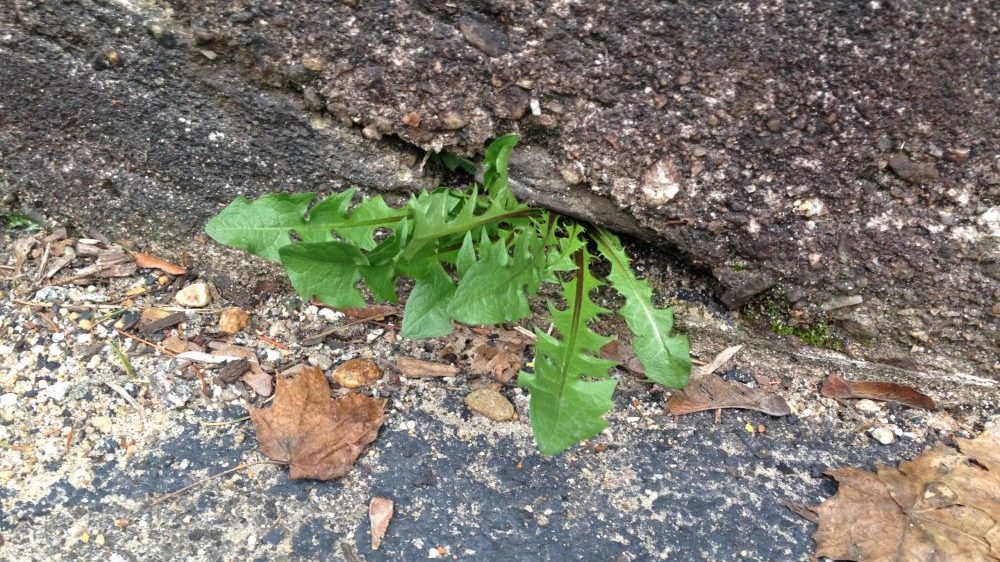My Thoughts on COVID-19 as an Herbalist ~
With COVID-19 heating up across the world, you're probably hoping I'm here to tell you about all the magical herbs you can stock up on and take that will protect you from disease and treat it if you do get sick. Yes, I DO believe that herbs, diet, and lifestyle can play a profound role in our resiliency to stress, infection, and challenging times. But I want to temper this with the full disclosure that I'm not a COVID-19 expert. Really none of us are, not even the scientists and doctors. This disease is just too new. And beyond the semantics that make it technically illegal for herbalists to use terms like "treat" and "cure" for "disease," herbs actually don't generally "cure" or "100% prevent" infections.
What we hope they can do is improve our resistance and resilience and support the body in its own healing processes. Like the tough dandelion popping up in the cracks of the pavement and stone walls, we want to do whatever we can to thrive in spite of adversity.
First, a reality check. I'm really disappointed in businesses of all sorts – including herbal – profiteering off people's fear. Please take anything you hear with a big grain of salt, including this blog post from me, but especially if it comes alongside a product sold. (That said, my motivation is purely to educate, comfort, and inspire. I have no products to sell you, no affiliate links in this message, no class I want to sell you. I'm not even trying to get you to be my client because my practice is not set up for the acute/fast care that this disease demands.) COVID-19 is so new. We have no idea yet what drugs could work. We have no idea yet what herb will work best. But what we as herbalists CAN do is make educated guesses. We can do what we always do that usually works well. We look at individual patterns and symptoms and seek herbs that we have traditionally used for similar patterns and symptoms in the hopes that they will help. It doesn't always work, but often it does.
The other challenge to offering you potentially useful herbal information is access. Many stores are closed, and those that are open for shipping and curbside pickup are overwhelmed with orders and rapidly depleting stock. I also don't want you to buy any and every herb that might work, which will deplete stock further, and you might never actually use or need it.
Instead, let's be adaptable. Let's learn how to listen to our bodies and think critically about which categories of herbs might work best for particular symptom patterns. Let's think about herbs that are readily available and how to adapt a plan to what's on hand and what you can get. Let's also look at the big picture of health, which is so much more than just herbs, readily accessible, and often the most useful of all.
What Are Our Goals?
1. Reduce our own exposure to COVID-19 germs from infected people (who may or may not have symptoms, surfaces, community spread, etc.
2. Reduce the likelihood that we pass the disease on to others if we have the disease (which we may or may not know we have, with or without symptoms).
3. In doing all of this, slow the spread so that medical professionals and facilities can keep resources up with the demand and be capable of taking care of people with acute medical needs. Eventually we're all likely to be exposed, but if we can slow it down and "flatten the curve" of cases, then hopefully we can give those who need acute care the fighting chance to survive. This is essential and can be done if we all follow the CDC guidelines.
4. Help people hopefully reduce the likelihood of developing a severe infection (by improving resistance) by supporting a healthy immune system.
5. Provide whatever supportive care we can to manage mild to moderate cases that do not require medical intervention to hopefully make people more comfortable and resilient. We can also use herbs to support in non-disease-focused ways, such as easing the stress and anxiety that can be associated with the panic of a pandemic and the seismic societal and economic shift we're experiencing.

First, Don't Forget the Basics
Alongside the CDC recommendations to shelter in place, maintain social distancing, wash hands regularly, and wear a homemade mask if you must go out (all of which are crucial), don't underestimate the ability of the basic tenants of health in maintaining vitality. Get adequate sleep, manage stress as best you can, get outdoors for regular walks and time in nature if possible, reduce or eliminate sugar, reduce or eliminate alcohol, exercise regularly, and eat a healthy diet. Taking a multivitamin might help cover a few bases, too. While there are no guarantees, these are the most important things you can do to reduce your risk of getting infected and improve your overall vitality so if and when you are exposed, your body is better able to recuperate. And they do not require anything special at the store.
Many people who have COVID can pass the disease even if they themselves show few or no symptoms. (Silver lining: Many people who are exposed have few or no symptoms. Downside: This is partly why it's so hard to contain.) It's safest to just assume anyone could have it, including you. Act not only protect yourself from others but also to protect you from spreading it to others who may be high risk. It's been really weird to drop off groceries at our parents porches and then wave to them at a 6+ foot distance instead of the usual hugs and kisses. But that's what we need right now.
If no one in your house is sick and you're sheltering in place, you don't need sanitizer nor a mask. But, if you need to go out to the store or your essential job requires you to expose yourself, then alongside frequent hand washing and social distancing (and a homemade mask – here's an easy way to make one without a sewing machine), DIY sanitizer wipes are helpful. If by chance you have rubbing alcohol, denatured alcohol, or high-proof grain alcohol, or can find it at the store/online, you can easily make your own wipes. Maybe you have a bottle of Everclear in the back of your closet because you've heard that I recommend making fresh tinctures with it? That will work! Or an old bottle of rubbing alcohol in the medicine cabinet – that works, too! (Unfortunately, you'll have a hard time finding high-proof alcohol in stores and online right now, and its probably better to leave what's "out there" to the medical professionals who are (no joke) being told to make their own PPE because many hospitals are totally out. Hopefully the sanitizer manufacturers will get more to the masses soon, and I'm encouraged to hear about alcohol distilleries making and donating sanitizer to medical workers.)
- Cut up an old t-shirt, bandana, dish towel (some kind of thin fabric) into small squares.
- Shove them tightly into a small jar with a tight-fitting lid.
- Lightly saturate with alcohol. It needs to be 60-80% pure alcohol to work *
- If you have 151-proof alcohol or 70% rubbing isopropyl alcohol, you can use this undiluted.
- If you have 190-proof alcohol or 90-99% rubbing isopropyl alcohol, then you can dilute it with 1/3 water (or aloe or glycerine but I prefer water).
- Wipe down surfaces/hands and let air dry.
* About alcohol: Regular 80-proof and 100-proof vodkas are NOT strong enough to sanitize. To figure out the percent alcohol, cut the proof number in half. So, 100-proof is only 50% alcohol, and 80-proof is just. 40%. 🙁 Sorry!
I use this to wipe down my hands and the cart before shopping. Then I grab a new one to wipe down afterwards. And of course be mindful to touch as little as possible, including your phone, face, etc. This is not the time to read labels to pick out a product. We also use these wipes to wipe down groceries before they come into the house (and/or we quarantine things for a few days just to be safe). The data on how long COVID remains viable on surfaces varies from a few hours to several days (possibly longer) – shorter for more porous surfaces like paper and cardboard, longer for hard surfaces like plastic or metal – and surfaces are not thought to be the main way the virus spreads.
Try to limit shopping trips as much as possible, and if you're high-risk don't hesitate to ask neighbors or loved ones to do your shopping for you (leaving it outside the house, items quarantined or sanitized before coming in). Also try to find curbside pick up, shipped, or delivery opportunities. Be Patient: Stores are swamped with work and requests, and you probably won't be able to get everything on your list.

Herbal Approaches for Immune and Respiratory Support
Again, we really don't know what will or won't work for COVID-19, and you should think of herbs as supports, not cures by any means. (There is no cure, herbal or medical.) If you have symptoms of illness, call your doctor for advice, including whether or not you should get tested or require medical intervention. If your symptoms are mild to moderate and your doctor has advised you stay at home, then by all means feel free to use herbs to support your immune system and the healing process. This is a beautiful place for herbs, especially since modern medicine has little to offer in these stages. Listen to your body for what seems to be helping or not. If your symptoms become severe – such as having difficulty breathing – please seek immediate medical attention, following local protocols for potential COVID infections.
Potential Prevention
Remember the basics (above) – they're the most important! Studies have found that just one night of skimped sleep made people three times more likely to develop the common cold when exposed versus those who got a good night's sleep.
Additionally, many herbs and medicinal foods may play a role in strengthening and modulating the immune system so that it's healthier and more resistant to infection. This doesn't necessarily mean that you won't or can't get sick, but hopefully your body will be better able to fight it off more promptly and with less severe symptoms.
Always listen to your body – if an herb seems to not agree or makes you feel worse, stop taking it. If it seems like it's not working well enough, try something else and/or seek professional guidance.
Daily Immune & Prevention Support
Astragalus Root: Best taken daily when you're not sick or you're in the recuperative phases to strengthen the immune system. (It's not typically taken in the acute illness stage.) Available in pill, tea, or tincture. It tastes pleasant enough to simmer with ginger, cinnamon, or other spices, toss into soup broth, or add the powder to food.
Mushrooms: Medicinal mushrooms like reishi are my first go-to. Reishi is also a lung tonic with a variety of side benefits (even for sleep, anxiety, and stress), though it's a bit more medicinal tasting. Shiitake mushrooms are tasty additions to broth, food, etc. I have dried shiitake that I grind into powder to add to soup, broth, stir fries, etc. Other medicinal mushrooms include maitake, turkey tails, lion's mane, etc. But even common culinary mushrooms like button and crimini/baby bellas have benefits. Mushrooms, taken or eaten regularly, work much like astragalus to strengthen and modulate the immune system so that it functions better. Mushrooms should not be eaten raw. Cook, simmer, or use special supplement extracts. More on mushrooms including tea and broth recipes in this blog post. If you do not tolerate mushrooms, try astragalus instead.
General Pungent and Aromatic Antimicrobials: It can't hurt to have garlic, onions, ginger, oregano, rosemary, thyme, bee balm, holy basil, certain evergreens (like white pine, balsam fir, hemlock tree) as part of your daily diet and tea routine. These have varying antimicrobial action and also tend to support the respiratory system.
See my blog on building resistance via immune, stress, and digestion support for more.
When You Might Be Exposed or Susceptible
Elderberry? We really don't know if elderberry will work for COVID-19, but it does often help with the flu and common cold, and some lab evidence suggests benefit for other coronaviruses. The time for elderberry is early when you suspect you're more susceptible or could be exposed or during those first inklings of illness. It seems to work mainly by preventing the virus from breaking into your cells and replicating (so, less appropriate and less useful once the virus. has already spread rampant and you're very sick). There are some unlikely concerns that elderberry could make COVID infections worse via cytokine storm. See this blog post for more about elderberry. I personally prefer dried elderberry in syrup with elderflower, ginger, and cinnamon. Elderberry is sold out almost everywhere now, but check out small-scale herbal product makers. You'll probably need to call around.
Echinacea? Echinacea works a bit differently from elderberry though the timing to use it is similar. It's best taken when you're susceptible or exposed in frequent high doses. Echinacea tends to both modulate and mobilize the immune system as well as improve the lymphatic system's clearance of "battlefield debris." Be cautious in autoimmune disease; some people may have a flare.
More on general herbal immune support and recipes here.
Antimicrobials
It's hard to say if herbal antimicrobials can have a direct effect on infections like COVID-19, but they might still be useful in a formula and have various side benefits. Possibilities include those aromatic antimicrobials (raw garlic, onions, raw ginger, rosemary, bee balm, oregano, thyme, white pine needles, holy basil), elecampane root, and usnea lichen.
Soothing, Moistening Remedies When Things Feel Dry
If there's a dry cough, dry sore throat, or feelings of dryness, irritability, heat, and inflammation, consider remedies (especially teas) made with moistening, soothing herbs. Marshmallow root or leaf, plantain leaf, mullein leaf (strain hairs well through cloth or paper filter), licorice root, slippery elm bark, violet leaf, oatmeal tea, honey... Marshmallow root and slippery elm powder are the most slimy, so if you're super mucus-y. ("wet" and "damp") then they're probably not right for you, but the others are milder and might be just fine to balance a formula. I don't typically use slippery elm for sustainability reasons and am mentioning it only if you happen to already have it on hand in lozenge, tea, or dried herb form. Mullein leaf is specific for lung issues, helping to soothe irritation, ease spasm, and open the lungs. (If you're wildcrafting, make sure you don't accidentally harvest foxglove leaves instead! They're deadly and look very similar to mullein pre-flowering.)
Warming Expectorant Remedies
These remedies help move and shake mucus so that you're better able to clear it out. Many also offer antispasmodic and antimicrobial actions. Once again, I mainly turn to those aromatic antimicrobials (see above!), which are fantastic and often readily available in grocery stores, herb shops, and/or the garden. Additional medicinal herbs in this category include elecampane root, New England aster, and grindelia, but they're more. obscure and hard to find in commerce. Horehound leaf is a favorite of mine to take internally (preferably as a fresh plant tincture) to thin and expectorate mucus. I often combine it with nettle leaf and/or goldenrod tinctures, which have anti-histamine-like actions. But, again, these might be harder to find in commerce.
Try making a steam with aromatic herbs in a pot or large mug, inhale until it cools, then drink the warm tea. Two remedies in one! Favorites for this include peppermint, rosemary, bee balm, oregano thyme, anise hyssop, Korean licorice mint, fennel seeds, etc. It's nice to include soothing herbs to balance the blend, such as plantain leaf, marshmallow leaf, licorice root, violet leaf, honey, and/or mullein leaf (remember to strain irritating mullein hairs through cloth or paper filter before drinking).
Also don't underestimate simple kitchen remedies like garlic or ginger. For example, raw garlic crushed in honey, or ginger-lemon-honey tea. Rosemary or thyme go nicely in that ginger-lemon tea, too.
Diaphoretic Herbs for Fever
Fever is one of our body's natural responses to infection to help kill off a virus and resolve the infection. Sometimes it makes sense to take something like Tylenol to make someone more comfortable and better able to sleep, but hindering the fever process can also make it harder for your body to resolve the infection. Unless a fever is very high (which may require medical attention), it's generally best to support rather than fight the fever. Enter diaphoretic herbs that make you sweat and help the fever be more effective and hopefully resolve more quickly. Safe and readily available classics include ginger, elder flower, yarrow leaf/flower (not the tastiest but an amazing herb), and perhaps some peppermint (not as strong but nice for flavor). These are best drunk as hot teas, wrapped up in a blanket, letting that sweat all come out.
Sore Throat Support
Ginger tea, honey, lemon-honey tea, garlic honey, onion honey syrup, etc. are all easy kitchen remedies. If you have a bigger apothecary you can make a spray with echinacea tincture (numbing, antimicrobial, possibly anti-viral on contact), propolis (antimicrobial), antimicrobial herbs mentioned earlier (thyme, bee balm, pine, usnea...), and add something soothing like honey, glycerine, fennel seed, Korean licorice mint, anise, or licorice (especially if you're using all alcohol tinctures otherwise). It's not antimicrobial nor immune specific like these others, but for quick symptomatic relief, kava tincture will help numb a sore throat or irritated cough tickle temporarily. Not all of these, just use what calls to you that you have on hand. And never estimate the benefit of a warm salt water gargle. Or taking some aromatic antimicrobial tea to gargle and spit. Or sipping warm broth, perhaps with extra garlic and cayenne. Lots of options!
Learn more about lung herbs in detail here (including lung openers, antispasmodics, immune tonics, and respiratory restoratives) ~ including free downloads, 2.5 hour audio of my lung class, and more articles. Many of the herbs in my allergies blog post may also be useful for the lungs and are discussed in greater detail here, such as horehound, nettle, and goldenrod.
I hope you find these herbs helpful if you get sick!
Remember: The point here is not to stock up on all these things but to figure out what might help you best and then use what is available to you, ideally in your backyard, already in your pantry, at a local herb shop (curbside pickup or shipped), or your grocery store. Always research herbs in a few different places to get a feel for each one (nice resources listed here and here) and seek professional guidance if you're in over your head and medical care STAT if your symptoms worsen or get severe.
If you want to learn more about how herbalists across the country and the world are thinking about and dealing with COVID-19, check out the American Herbalists Guild COVID-19 Resource Hub. (So much fascinating info here, but it can also be total. information overload for a newbie.)

Final Thoughts & Silver Linings to a Global Pandemic
This pandemic is awful in a lot of ways, and I am not denying that nor belittling those serious, life altering challenges. But, I do want to bring some positive thought and gratitude to the table, especially for those of you who are quarantined at home:
- A simpler pace and lifestyle
- More time to connect with others in your household (or virtually with others elsewhere)
- A diet focused on mainly or entirely home-cooked real food
- Time to exercise in the home and by walking on the street or on the trails where possible
- Time to garden in the backyard or windowsill or work through that household project list
- Time to spend in nature
- Opportunity to relax, read a good book (lots of good books!), focus on online learning, practice spring plant identification, virtually visit museums, play board games, play yard games, work on arts and crafts, focus on getting a good night's sleep, snuggle on the couch with your loved ones (and companion animals), mediate, or, yes, binge-watch the latest movies or TV series
While there is a lot of stress to a global pandemic, many of my clients are actually reporting better health because of the reduced stress of the daily grind (even those who are now unemployed), at-home meals, better sleep, and time for some TLC.
Take comfort in knowing...
- The vast majority of people exposed to the virus will have symptoms ranging from none to moderate, which we can weather at home and recuperate from just fine (even though, some people will get seriously ill and may die, and we are willing to take responsibility to reduce that risk as much as possible). We're fortunate that this disease is not more gruesome and deadly.
- This is temporary. Even if it lasts for months, it will eventually pass.
- The stock market and economy will bounce back once this passes, and perhaps in many ways we will be stronger for the lessons we have learned.
- The hard lessons we learn during this pandemic will hopefully be a catalyst for positive changes in the future.
- We are resilient. We are strong. We are loved.
Don't forget to ask for help if you need it and to offer assistance if you can give it. If you are heading to the store, see if your neighbors or older loved ones need you to grab anything for them, send cards and letters (homemade will do!) or emails and check in via video chat and phone calls. We may need to physically distance ourselves from others who are outside our households, but that doesn't mean we can't become closer as as a community.
Stay cozy, safe, and well ~
Clinical herbalist Maria Noël Groves sees clients and teaches classes at Wintergreen Botanicals Herbal Clinic & Education Center in Allenstown, New Hampshire.
The statements made on this blog have not been evaluated by the FDA and are not intended to diagnose, prescribe, recommend, or offer medical advice. Please see your health care practitioner for help regarding choices and to avoid herb-drug interactions.

